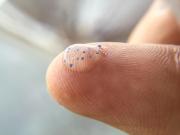

Subscríbete al SCP News
Microbeads found in personal care products in Albania and Bosnia and Herzegovina, call for action

Several personal care and hygiene products produced in Albania and Bosnia and Herzegovina have been found to contain microbeads (defined as plastics smaller than 5 mm). These particles end up in wastewater system and ultimately contribute to the problem of marine litter. This research has been conducted by SCP/RAC in collaboration with partners in the countries.
Microbeads are a kind of microplastic with specific function for scrubbing or exfoliating. In cosmetics, “microplastic” refers to all types of tiny plastic particles (smaller than 5mm) that are intentionally added to cosmetics and personal care products. They are often used as emulsifying agents or just as cheap fillers. They have been an issue of concern since they contribute to the problem of marine litter, in addition to health problems.
Within the Cooperation Agreement signed in 2016 between UN Environment/MAP and the Italian Ministry for Environment, Land and Sea Protection, SCP/RAC has conducted a survey in 3 Adriatic countries (Albania, Bosnia and Herzegovina and Montenegro) in order to find out whether microplastics were being used as ingredients in personal care products. For that, a team of 20 people has checked ingredients on websites and on the spot by visiting shops in the 3 countries.
The ingredients found are: carbomer, polyquaternium 7 and 10, dimethilcone, and styrene/acrylates copolymer. They are used mainly as fillers or to provide exfoliating characteristics to the products. They can be found in a range of products such as liquid soap, accelerating tanning gel, anti-wrinkle cream, shampoo, and even baby cream.
Survey in Albania and Bosnia and Herzegovina has revealed national production containing microbeads. In Montenegro, that was not found.
At the global level, this issue has been addressed particularly through the Beat the Microbead since 2012. This campaign is being run by 100 NGOs in 42 countries. The campaign approached producers requesting them to phase out the use of microbeads in their products, and recently launched a EU petition to ban microplastics in cosmetics.

Who can help to phase out microbeads in personal care products?
Industry. There are plenty of natural ingredients already available on the market that can easily replace microbeads while offering the same properties (scrubbing, filling). These include: whole oats, jojoba beads, salt, dairy, coffee, lemons, or sugar. There are many shops already offering these products, for example Boots, with the brand St Ives. There are also suppliers offering these natural ingredients, for example, walnut shells offered by Composition Materials.
Governments are advised to follow processes at the global, regional and European level at this regard, and take action as appropriate to phase out microbeads in personal care products. At the beginning of the year the European Chemical Agency (ECHA) submitted a restriction proposal for microplastic particles that are intentionally added to mixtures used by consumers or professionals.
Citizens will be able to easily check whether products contain microplastic by using the Beat the Microbead app (the information from the countries is being integrated and will be soon available). The country specific list classifies products as red, orange, green and “zero”. Hundreds of products are already included in this database, while for the 3 Adriatic countries the information is made available for the very first time.
NGOs can approach national producers to call for phasing out the use of microplastics. For that, the Beat the Mircrobead campaign offers a template letter which has been translated to Albanian and Bosnian-Montenegrin by SCP/RAC. This approach has been very successful in promoting changes from one of the largest beauty and cosmetics group such as L’Oreal.














